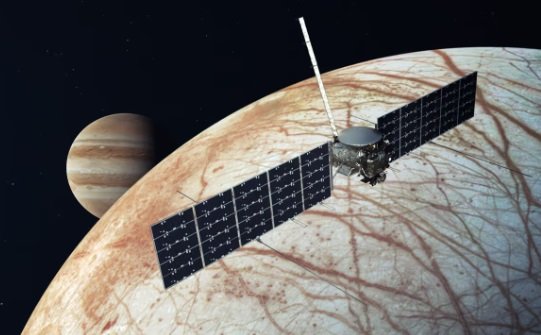
On October 10, NASA is set to launch one of its most ambitious space exploration missions to date—the Europa Clipper. This groundbreaking mission aims to investigate whether alien life could exist on Europa, one of Jupiter’s enigmatic moons. With NASA’s largest spacecraft ever built leading the charge, the mission promises to unlock secrets about the potential habitability of this distant celestial body.
Mission Purpose: A Deep Dive Beneath Europa’s Icy Surface
The primary objective of the Europa Clipper mission is to explore whether life could exist in the vast ocean scientists believe lies beneath Europa’s thick, icy shell. While Mars often captures the spotlight in the search for extraterrestrial life, Europa has become a focal point due to the tantalizing possibility of liquid water beneath its surface—an essential ingredient for life as we understand it.
Water, known for its life-sustaining properties on Earth, dissolves vital substances necessary for organisms to survive and thrive. The existence of a subsurface ocean on Europa—protected beneath kilometers of ice—has raised hopes that it could offer similar conditions for life. Despite Europa’s distance from the Sun, the presence of liquid water, combined with other favorable factors, has made it a top target in the search for life beyond Earth.
Jupiter’s Gravitational Influence: The Key to Warmth
Jupiter’s powerful gravitational forces play a crucial role in maintaining Europa’s subsurface ocean. As Europa orbits the gas giant, Jupiter’s immense gravity creates tidal forces that generate internal friction, keeping the moon’s interior warm. This heat, in turn, may prevent the water beneath the ice from freezing solid, sustaining a liquid environment similar to what has been found on Saturn’s moons Titan and Enceladus, which also harbor liquid water.
The combination of water and heat could provide the necessary conditions for life to emerge, making Europa one of the most promising candidates in the search for extraterrestrial life within our solar system.
Cutting-Edge Technology: Europa Clipper’s Advanced Instruments
The Europa Clipper is equipped with nine sophisticated scientific instruments designed to conduct a thorough investigation of Europa’s surface, chemical composition, temperature variations, and potential water plumes that might rise from the subsurface ocean. These instruments will gather crucial data to help scientists assess the moon’s potential to support life.
One of the most exciting aspects of the mission is the possibility of detecting water plumes erupting from cracks in Europa’s ice. If these plumes exist, the Europa Clipper will be able to analyze them directly, offering a unique opportunity to study the water from Europa’s hidden ocean without having to drill through the ice.
Challenges and Long-Term Goals
While the launch of the Europa Clipper is a significant milestone, the mission will require patience. It will take over five years for the spacecraft to reach Jupiter, and even longer to gather and analyze data from Europa. This mission represents the first step in a broader quest to determine whether life could exist on this distant moon.
Should the Europa Clipper mission yield promising results, it may pave the way for future missions to directly search for life. These subsequent missions could involve landing on Europa’s surface or deploying probes to explore the ocean below its icy crust.
A New Frontier in the Search for Life
The Europa Clipper mission marks an exciting chapter in humanity’s search for life beyond Earth. By exploring Europa’s potential habitability, NASA is taking bold strides toward understanding the possibilities of life elsewhere in the universe. The insights gained from this mission could forever change our perspective on life’s existence beyond our home planet and bring us closer to answering one of the most profound questions in science: Are we alone in the cosmos?

